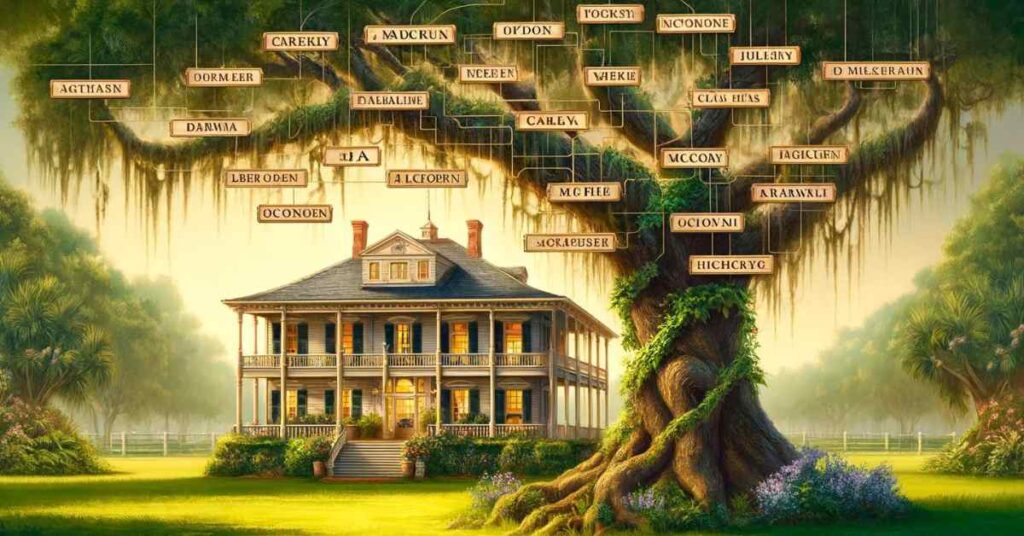Introduction to Southern Heritage and Last Names
Southern last names are more than just identifiers; they carry the rich tapestry of history, culture, and tradition unique to the American South. From the rolling hills of Virginia to the vast plains of Texas, these names reflect a blend of ancestries, including English, Scottish, Irish, and even Native American influences. This article dives deep into the world of Southern surnames, uncovering their origins, meanings, and the stories they tell.
The Historical Roots of Southern Surnames
The history of Southern last names is as diverse as the region itself. Initially influenced by the early British settlers, these names have evolved through centuries of migration, conflict, and cultural exchange. Many Southern families pride themselves on their last names, which often link them to notable historical figures, landowners, or even specific traits and occupations of their ancestors.
Common Southern Last Names and Their Meanings
Names Derived from English Ancestry
Many Southern last names have their roots in English heritage, reflecting the large number of English settlers who colonized the region. Names like Smith, Johnson, and Williams are ubiquitous, but each carries a unique history. For example, ‘Smith’ often indicates a lineage of craftsmen or metalworkers, while ‘Johnson’ denotes “son of John,” a common biblical name.

Examples and Origins
- Carter: This name, often found in Virginia and the Carolinas, originally described someone who transported goods by cart or wagon.
- Lee: A concise yet powerful name, Lee can trace its origins to an Old English word meaning “meadow” or “clearing,” and is famously associated with General Robert E. Lee.
Names with Scottish and Irish Influences
The Scottish and Irish also left a significant mark on Southern surnames. Names like McCoy, O’Connor, and McKenzie show the Celtic influence. These names often carry stories of hardship and resilience, as many Scots-Irish immigrants settled in the Appalachian region and other parts of the South.
Cultural Significance and Common Names
- McCoy: Known from the legendary Hatfield-McCoy feud, this name signifies “son of Aodh,” an ancient Gaelic personal name meaning “fire.”
- O’Connor: This name has Irish roots meaning “descendant of Conchobhar,” a name that implies “lover of hounds” or “wolf-lover,” showcasing the deep connection to nature and animals in Celtic culture.
The Influence of Geography and History on Southern Names
Names Reflecting Local Landmarks and History
In the South, many surnames are directly tied to geographical features or significant historical events. For instance, the name ‘Hill’ might indicate ancestors who lived near a prominent hill, while ‘Brooks’ suggests proximity to a small stream.
How Geography Shapes Identity
- Ashton: A name that could denote a connection to an “ash tree town,” reflecting the lush, wooded landscapes common in parts of the South.
- Shelby: Possibly derived from a place meaning “a willow grove,” this name echoes the natural beauty and the agricultural roots of the Southern states.
The Impact of Historical Figures on Southern Last Names
Many Southern families carry last names that honor historical figures or local heroes. These names serve as a living memory of the South’s tumultuous past and its defining moments.
Prominent Names and Their Stories
- Jackson: After Andrew Jackson, the seventh President of the United States, this name is synonymous with the spirit of independence and strength.
- Davis: Linked to Jefferson Davis, the President of the Confederate States during the Civil War, this name reflects a complex part of Southern history.
Unique and Uncommon Southern Last Names
Discovering Lesser-Known Southern Surnames
Beyond the common Smiths and Johnsons, the South is also home to a variety of unique and lesser-known last names. These surnames often have fascinating origins, tied to specific anecdotes or localized historical events.
Stories Behind Rare Names
- Talbot: This name, often found in Louisiana and other Gulf states, might have French or Norman origins, hinting at the multicultural tapestry of the region.
- Callaway: Seen primarily in Georgia and Alabama, this surname is thought to derive from the Welsh ‘Calwe,’ pointing to the early Welsh settlers in the region.
The Role of Heritage and Tradition in Preserving Names
In many Southern families, last names are more than a formality; they are a vital connection to the past. These names carry the weight of ancestry and are often preserved through generations with great pride.
The Cultural Significance of Names in the South
How Last Names Convey Social and Family History
In Southern culture, last names are a key to understanding social dynamics, family ties, and even historical land ownership. They can tell you about the wealth, status, or occupation of a family’s ancestors and often serve as a link to the region’s storied past.
The Importance of Family Legacy
- Faulkner: Made famous by the novelist William Faulkner, this name is synonymous with literary greatness and deep Southern roots.
- Forrest: Associated with Nathan Bedford Forrest, this controversial name reflects the complex and often painful history of the South.
Celebrating Diversity in Southern Last Names
The diversity of Southern last names reflects the region’s varied cultural influences, from African to French, Spanish, and Native American. This blend of heritages enriches the cultural fabric of the South and is evident in the array of surnames one encounters.
The Future of Southern Last Names
Trends and Changes in Naming Practices
As the South continues to evolve, so do the trends in last names. With increasing migration and the blending of cultures, new surnames emerge while others gain new meanings or adaptations.
Predictions for the Evolution of Southern Surnames
As demographics shift, names that were once rare or localized may become more widespread, and vice versa. This dynamic reflects the ongoing cultural exchange and adaptation within the Southern states.
Conclusion
The rich tapestry of Southern last names offers a fascinating glimpse into the history, culture, and evolving identity of the American South. From the common to the rare, these surnames tell stories of migration, conquest, and cultural exchange. As we look to the future, these names will continue to play a vital role in preserving the heritage and narrative of the South.
FAQs:
- What are some common themes in Southern last names?
- Themes include connections to geography, historical figures, occupations, and ancestral origins, reflecting a mix of English, Scottish, Irish, and other influences.
- How do Southern last names differ from those in other regions?
- Southern last names often carry historical and cultural significance unique to the region’s past, including ties to the Civil War, colonial times, and local landscapes.
- Can a last name reveal anything about a person’s origin in the South?
- Yes, many Southern last names can indicate a person’s ancestral region, family history, or even the type of occupation their ancestors had.
- How have Southern last names evolved over time?
- They have adapted with cultural shifts, migration patterns, and social changes, with some becoming more widespread and others remaining unique to specific areas.
- Are there any efforts to preserve rare Southern last names?
- Many families and historical societies work to document and preserve these names as part of the broader effort to maintain Southern heritage and history.

